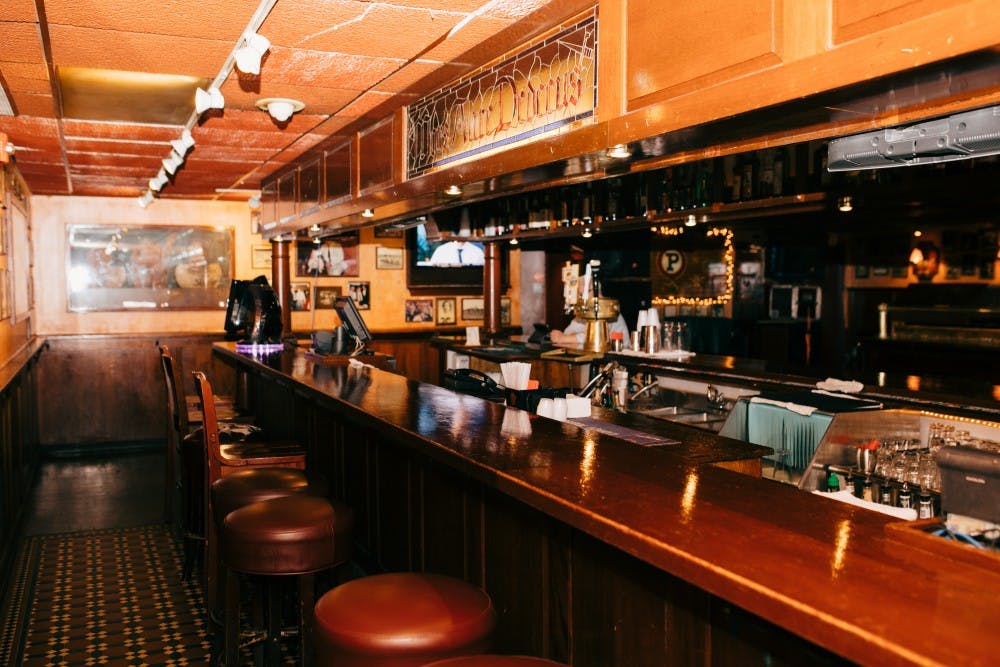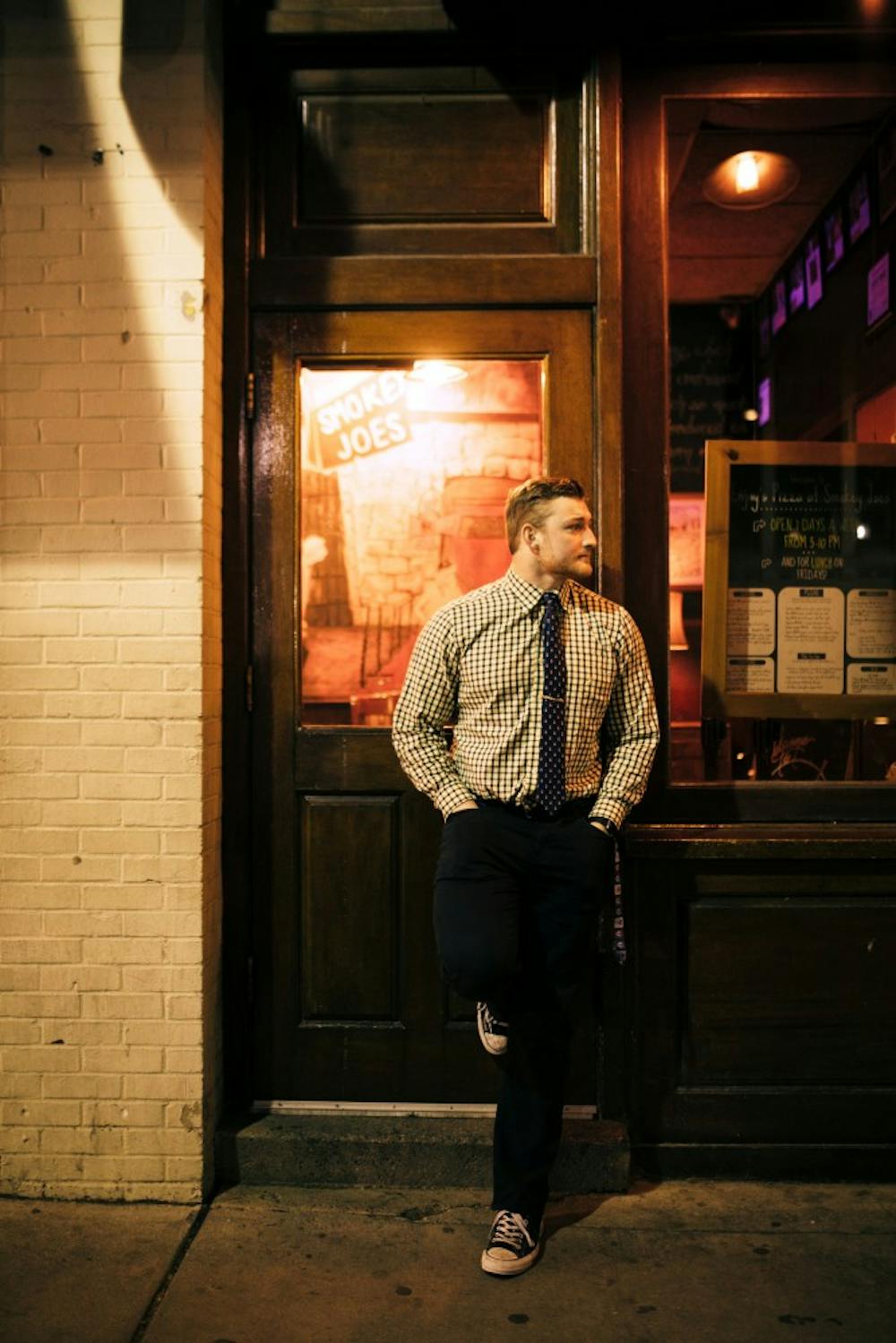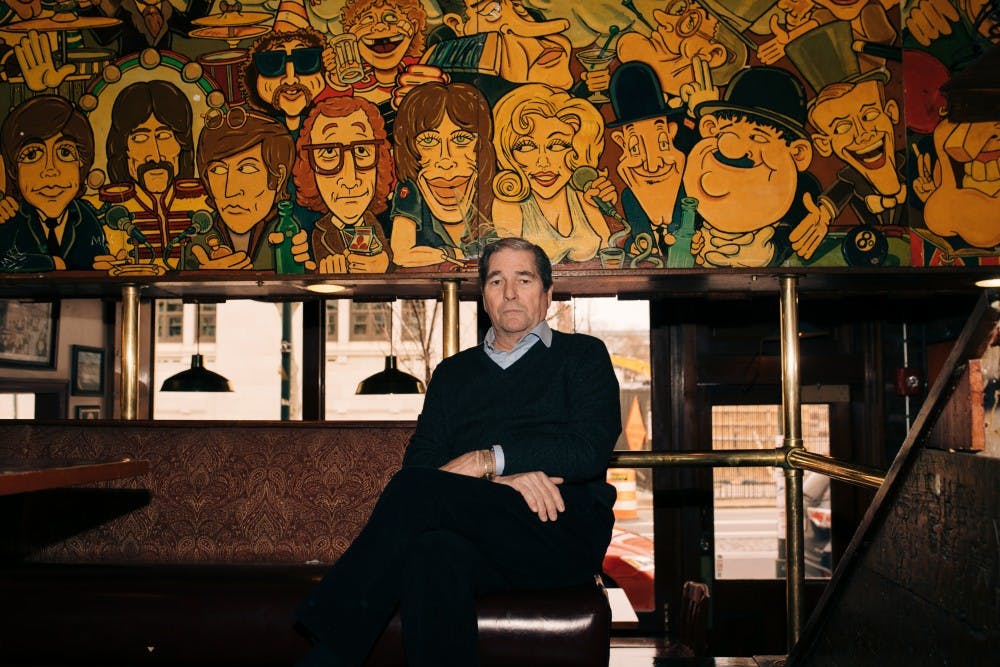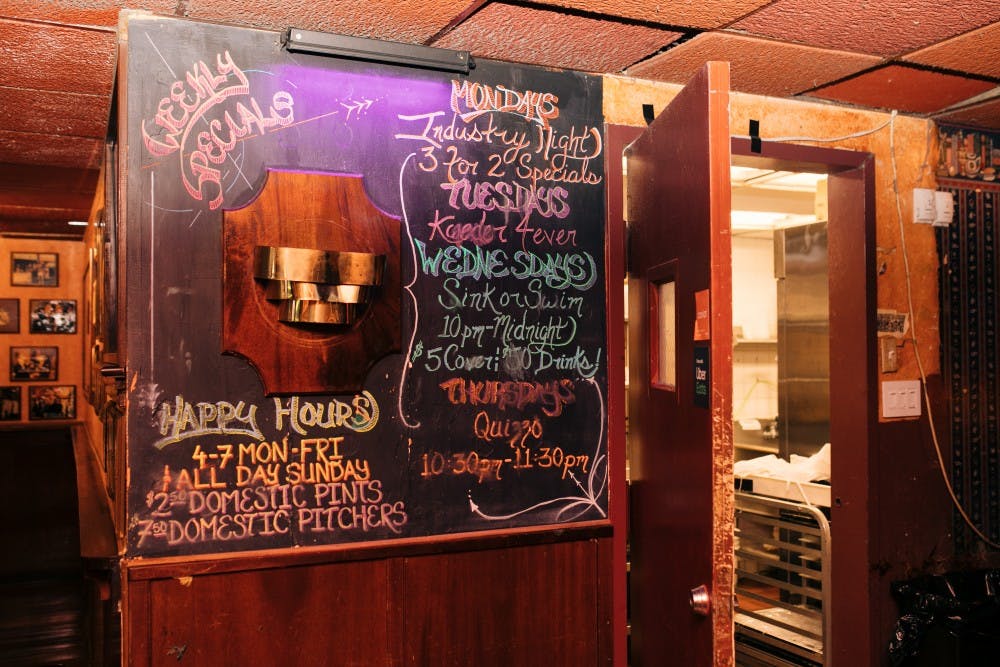It’s 10:10 p.m. at Smokey Joe’s on a Thursday. Choyce Bostian III (C ’20), wiggles an ID and holds it up to the light before handing it back to a girl standing at the door. “I can’t take this.”
Choyce, who works as a bouncer, hands the card back to the girl. She gives Choyce an incredulous look and lingers outside for a few seconds before walking away with a friend. It’s just ten minutes into his four–hour shift, and this is the third fake ID he’s seen.
“Just like that, there’s three,” he mumbles, and hunches down in his bar stool, ready for the rest of the night.
Choyce is a football player; he’s over six feet tall and can pull off a stern look when he’s angry. It’s already cold outside and he’s wearing two layers and a cozy vest, but his shift has just begun and he’s still making friendly conversation with another staff member. He doesn’t seem tired yet.
“Welcome to Smokey Joe’s, est. 1933, ‘The Pennstitution,’” reads a sign as I walk in. Though it was founded over nine decades ago, Smokey Joe’s, famously known as Smokes’, maintains its legacy as one of Penn’s most well–known bars. In his 1975 commencement address, President Gerald Ford proclaimed: “[Penn consists] of 16 institutions of higher learning and personal enlightenment—17 if you include Smokey Joe's.”
A night here in 2019 isn’t much different than the experiences of past patrons and employees who frequented the bar decades ago. The quirky characters, inclusive environment, and tight–knit staff are all features that define Smokes’ and have made it a beloved campus staple, both then and now.
“Smokes’ has always been the Pennstitution,” Heidi Tandy (C ’92), a regular at Smokes’ during her time at Penn, tells me over the phone. “It was probably the Pennstitution when my mother went there, and it’s because of its accessibility, its mellow attitude, and its acoustic acts that we used to have back there.”

Indeed, there’s light chatter and lighter music playing as I walk inside ten minutes later. A man in his 50s sits at a table in the corner, sipping on a large beer and watching the game with his daughter, who looks like a student. Five guys, also probably students, laugh loudly as they greet each other near the entrance. Around the bar, there are men in slacks and wrinkled button–down shirts, their blazers tossed on chairs nearby. An older couple walks around and looks closely at the sports pictures hung up on the wall. A waitress walks by wearing a denim jacket and black jeans, holding a receipt in one hand and an empty beer bottle in the other.
Jaimee Marshall (C ’85) recalls her time as a waitress at Smokes’ in the ‘80s while she was an undergrad at Penn. She particularly remembers the outfits, which were not especially flattering on her. They comprised of navy khaki pants, a blue button–down shirt, and a red and blue striped tie. I sense her distaste over the phone.
Jaimee remembers chatting with patrons, sometimes even sitting down with guests. Once, she was caught stealing a french fry off of a patron’s plate. Pat Ryan, one of the owners, gave Jaimee a look that made her stand up and get back to work. “I was probably having a little bit too much fun,” she says.
Sarah Keating (C ’85), who worked with Jaimee at Smokes’, remembers the characters and the regulars that she found hilarious. She tells me about Magic Bob, who owned a UniMart convenience store down the street and would come in for a couple of drinks every afternoon.
There was also a guy named Gary, who the staff called Puppet Man. Sarah says Puppet Man didn’t talk as a person, but came in with a bag of puppets that had names, like Booboo Kitty.
“He would be like, ‘Booboo Kitty would like a beer’ and, ‘Booboo Kitty would like a hamburger,’ and you'd have to take his order by a puppet,” she says.
Once, a homeless man nicknamed Mike the Nut, who helped clean up the bar every night, gave Sarah a birthday present in a brown paper bag. “In it was a gun … I opened the bag and of course, I touched the gun. Now I’ve got my fingerprints on some random gun.”
Then there was Wilbur, who worked at the movie theater next door, and Hoagie, who was a bartender at Smokes’ that drank himself into a stupor every night. The nicknames were half the fun, she tells me. “It was just Magic Bob. Wilbur, I guess, was his name, but did Wilbur have a last name? Probably,” she says.
“It wasn't work. It was literally a party every night.”
At 11:20 p.m., Choyce stands up from his seat near the entrance and positions himself near the door so that “no one can squeeze by.” Inside, Smokes’ is hosting a Penn Hillel Quizzo event, but they’re not letting any more underage students inside. Choyce rejects another ID.
“Are you serious?” the girl asks.
Choyce nods. “Have a good night.” He throws a peace sign in her direction as she walks out of the door.

Like Jaimee and Sarah, Choyce enjoys talking to patrons. He’s headstrong and vocal—important traits for a bouncer. Plus, the bartenders and waitresses who work there have become his “bar family.”
Choyce often works at Smokes’ from 10 p.m. to 2:30 a.m., sleeps for fewer than three hours, then wakes up in time for morning football practice. But it’s “good money” that he needs to pay rent.
Also, working for Paul Ryan and his family, who’ve owned the bar since 1952, has really been a “character grower.” He tells me that Mr. Ryan is a good businessman who cares a lot about what he does. His son, also named Paul, is “kind of dry and kind of dark,” but he makes the job “interesting.”
Paul, the son, is managing the place tonight. He runs around the bar, takes his new puppy for a walk, then sits by the entrance to make sure that Choyce isn’t letting underage students slip in.
“I’m just a glorified babysitter,” he mutters.
Everyone I’ve talked to has mentioned the Ryans—how the Ryans made both their employees and their patrons feel welcome. Corinne Keller (W ’85) and Randi Rosenberg (C ’85), who also worked as waitresses at Smokes’ alongside Jaimee and Sarah, both still include their jobs at Smokes’ on their resumes and LinkedIn profiles.
Randi, a lawyer who’s worked at many firms, says that to this day, the Ryans are probably the best bosses she’s ever had. They had perspective, especially considering they were running a business where their employees were almost all around 19 years old. They made their staff feel comfortable.
While working there during her senior year, Corinne asked Pat and Paul Ryan (her bosses at the time) to write a recommendation for a job. As a prank, they showed Corinne a fake recommendation describing how awful she was.
Sarah remembers the loyalty she felt toward the Ryans. She tells me about a period of time in which she worked with a bartender who stole money from the bar. He would charge a patron $35 for 10 shots but would go to the cash register and ring in $10, and keep a tab in his head of how much money he had scammed. At the end of the night when Sarah counted her tips, she made two or three times more on the nights that she worked with this one guy.
“Randi and I were so torn because we didn't want to steal from the Ryans but we were kind of complicit in it because we knew, so we ended up telling them and they watched him and they fired him,” Sarah says. “But that's how loyal you were to these people because they were so good to you.”

Paul Ryan, one of the owners of Smokey Joe's
Just like Choyce, Sarah recalls the whole staff being close to each other. One year, they played an employee softball game on the grass across from Smokes’. A man stole her backpack from the sidelines. She began chasing after him onto 40th Street.
“The next thing you know, there’s like 30 bouncers on top of this guy,” she says. “Everybody was so protective and if anybody was giving you a hard time at the bar, the bouncers were right there. It was just such a great place to work. I can't say one bad thing about it.”
To this day, Corinne, Sarah, Jaimee, and Randi are still good friends. In my interview with Randi, she predicted what the other waitresses would say about their time working at Smokes’. “Sarah talked a lot about the characters there, Jaimee talked about herself interacting with the patrons and how she'd sit down at the tables and eat all of their food. I'm predicting exactly,” Randi says. “Corinne and her sister, they needed the money during the time, and it was probably really lucrative.”
By 11:30 p.m., the Hillel Quizzo event is in full swing, and it’s much louder than it was an hour and a half ago. The emcee for the event is about to announce the winner. “Shh,” she breathes into the microphone, but it doesn’t get any softer.
The DJ for the night sits with Choyce, talking to Paul and waiting for the Quizzo event to end. She’s sipping a Red Bull, which looks green in the fluorescent light. At around 12 a.m., underage students who were attending the Quizzo event leave, and the DJ takes her place in the booth. A few moments later, “Hollaback Girl” by Gwen Stefani blares and patrons stomp to the beat.
Melissa Jacobs (C ’92) worked as the first female DJ at Smokes’ in the early ‘90s. She remembers when Paul bought a karaoke machine, which, back then, she thought was the “tackiest thing ever.” It ended up being fun, though, when people would go up and sing while she took a break from the DJ booth.
In particular, Melissa remembers an incident in which a bartender told her that he could sing. “He used to sing 'When Doves Cry' by Prince, and it was like his song. Every once in a while he would come out from behind the bar and everyone would get quiet,” she recalls. People didn’t expect such a big bartender to have a beautiful voice.
Starting at midnight, cars roll up in front of Smokes’, and students hop out of their Ubers wearing high heels, leather jackets, black dresses, and suits. There are date nights today, and Smokes’ is the place to be afterward.

It’s not that crazy tonight, Choyce says. He recalls his one of first days working as a bouncer at Smokes’ during Erin Express, a St. Patrick’s Day bar crawl. Choyce and another staff member tell me about the students who passed out in front of Smokes’ before even getting inside. They remember another time when someone was thrown through the porta potties set up in front of the bar during the Erin Express.
Melissa tells me that she always kept a flashlight and a baseball bat in her DJ booth. Once, during Erin Express in the early ‘90s, someone from another school came behind the booth and picked her up, put her over his shoulder, and tried to walk out of Smokes’ with her. Of course, the bouncers “were all over him.” After that, she bought the baseball bat to protect herself and the flashlight so that she could signal for help to the other bartenders or bouncers.
Likewise, Choyce emphasizes the importance of safety. “It’s a college campus, but I’m still a bouncer,” he says as he analyzes the gradient behind an ID photo and checks how perfect the signature is. He’s especially annoyed when people come back once or twice after he’s already rejected their ID.
The Ryans are strict about preventing underage drinkers from entering during Smokes’ late hours, since it’s such a big liability. In the early ‘90s, Melissa says, the Ryans implemented a camera system that recorded students saying, in their own words, that they were of age. “That deterred a lot of people. People were much more cautious about using their fake IDs.”
By around 1:30 a.m., the dance floor empties. Students linger around the bar and some stumble out with their friends or their dates while the music pounds loudly. Choyce shakes my hand and gives me a tired look as I get ready to leave.
Melissa remembers how she would time the songs so that the last two were slow songs, “because if you were going to hook up, this was your chance.” "Nothing Compares 2 U" by Sinéad O'Connor and "Everything I Do" by Bryan Adams were her go–tos.
Some aspects of Smokes’ have changed since the ‘80s and ‘90s. The layout is different and the place is slightly more polished. But Heidi says the bathrooms are still “disgusting.”
Heidi tells me that she was one of the two or three kids on campus who had a video camera in the early ‘90s. She still has very low quality videos of her class on Hey Day morning with fluffy hair and red shirts. She remembers how Smokes’ was happy to host them at ten in the morning, even though they were spitting pieces of styrofoam hats all over the floor.
“I guess they still do that, and I love that that's something that's eternal about Smokes' and about Penn and about traditions and consistency,” she says. “No matter what era you're from, you're able to have this place.”
